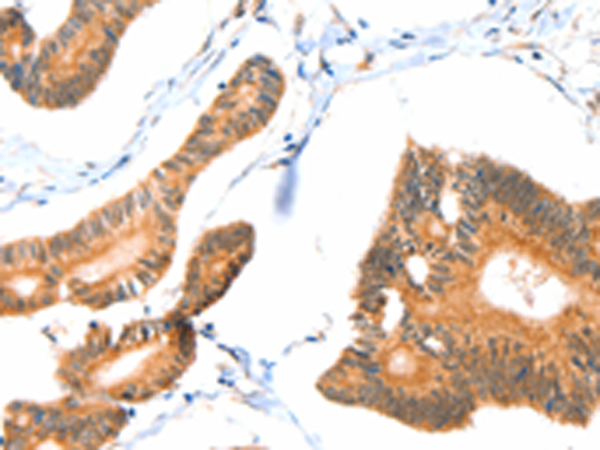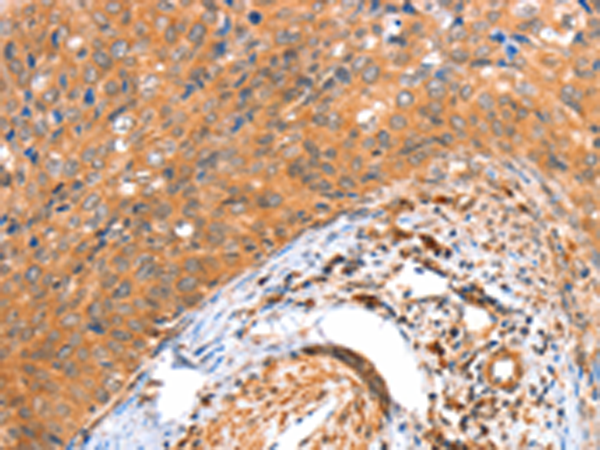

| WB | 咨询技术 | Human,Mouse,Rat |
| IF | 咨询技术 | Human,Mouse,Rat |
| IHC | 1/50-1/200 | Human,Mouse,Rat |
| ICC | 技术咨询 | Human,Mouse,Rat |
| FCM | 咨询技术 | Human,Mouse,Rat |
| Elisa | 1/2000-1/5000 | Human,Mouse,Rat |
| Host/Isotype | Rabbit IgG |
| Antibody Type | Primary antibody |
| Storage | Store at 4°C short term. Aliquot and store at -20°C long term. Avoid freeze/thaw cycles. |
| Species Reactivity | Human |
| Immunogen | Fusion protein of human ACOX3 |
| Formulation | Purified antibody in PBS with 0.05% sodium azide and 50% glycerol. |
+ +
以下是3篇关于ACOX3抗体的参考文献及其摘要概括:
1. **"Characterization of the human peroxisomal acyl-CoA oxidase gene family"**
*Authors: Van Veldhoven PP, et al. (2005)*
摘要:该研究鉴定了人类过氧化物酶体酰基辅酶A氧化酶(ACOX)家族成员,包括ACOX3.并开发了特异性抗体。通过免疫印迹和免疫组化验证抗体在肝脏和睾丸组织中的表达,揭示ACOX3在支链脂肪酸代谢中的潜在作用。
2. **"ACOX3 deficiency disrupts lipid homeostasis in mouse testis"**
*Authors: Ferdinandusse S, et al. (2010)*
摘要:利用ACOX3特异性抗体,研究发现ACOX3基因敲除小鼠睾丸中脂质代谢异常,导致精子生成障碍。抗体通过Western blot和免疫荧光证实ACOX3在睾丸支持细胞中的高表达,提示其参与生殖细胞发育相关的脂质重塑。
3. **"Peroxisomal acyl-CoA oxidase type 3 (ACOX3) as a biomarker for prostate cancer progression"**
*Authors: Smith BT, et al. (2018)*
摘要:通过免疫组化分析发现,ACOX3在前列腺癌组织中表达上调,与肿瘤侵袭性相关。研究采用商业化ACOX3抗体验证其作为潜在生物标志物的可能性,并证实其通过调控氧化应激促进癌细胞迁移的机制。
The ACOX3 antibody targets acyl-CoA oxidase 3 (ACOX3), a peroxisomal enzyme involved in the β-oxidation of branched-chain fatty acids and bile acid intermediates. ACOX3. encoded by the *ACOX3* gene, plays a specialized role in metabolizing methyl-branched fatty acyl-CoAs, distinguishing it from other acyl-CoA oxidases like ACOX1 and ACOX2. This enzyme is critical in lipid homeostasis, particularly in tissues such as the liver, testis, and brain. Research on ACOX3 has gained interest due to its potential links to metabolic disorders, neurodegenerative diseases, and cancer, though its precise physiological and pathological roles remain under investigation.
ACOX3 antibodies are typically developed using recombinant protein fragments or synthetic peptides corresponding to unique regions of the human ACOX3 protein. These antibodies are widely used in techniques like Western blotting, immunohistochemistry, and immunofluorescence to detect ACOX3 expression levels, tissue distribution, and subcellular localization. Commercial ACOX3 antibodies are often validated for specificity through knockout controls or siRNA silencing. Studies utilizing these antibodies have explored ACOX3's involvement in lipid metabolism dysregulation, its expression patterns in tumors, and its interaction with peroxisomal pathways. However, challenges persist in standardizing antibody performance across studies, emphasizing the need for rigorous validation in experimental models.
×